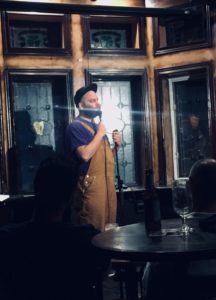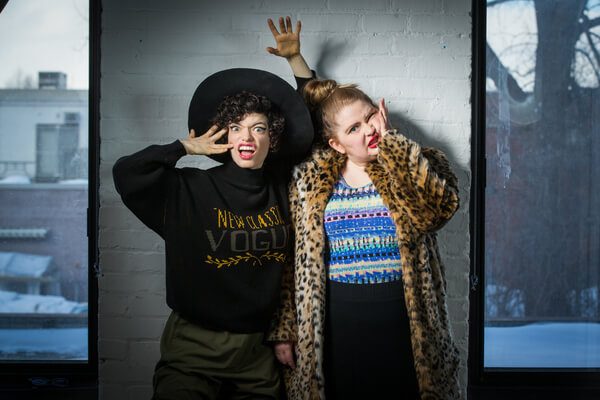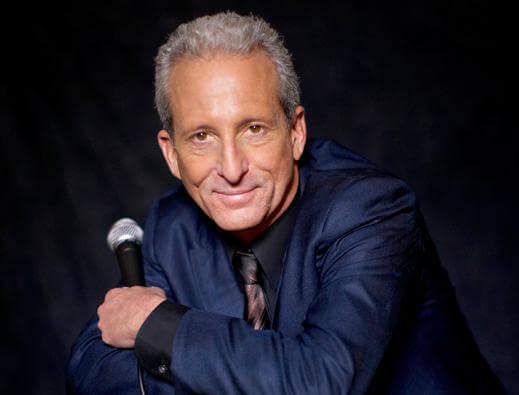Chatting with Sasheer Zamata about Pizza Mind, Party Time and Just For Laughs
If you’re a Trekkie, the name Sasheer may have a different meaning to you. But for the Mob, it represents a strong, funny and talented comedian named Sasheer Zamata.
Zamata has been working on her craft as a stand-up comic and sketch performer for many years. In addition to her time as a cast member on Saturday Night Live, she has made appearances on CollegeHumor, Totally Biased with W. Kamau Bell, Inside Amy Schumer, and Transparent.
Our very own Sassy Jo had a chat with Zamata about her new SEESO comedy special Pizza Mind, her monthly show Party Time in Brooklyn, her work as a celebrity ambassador for the ACLU, and her upcoming shows in Montreal for the Just For Laughs Festival.
Jo: You started out doing improv and sketch. When was the first time you tried stand-up and what do you like about it versus improv?
Sasheer:
I started stand-up because I was taking improv classes, and people in my classes were playing around with the idea of doing stand-up and saying how the idea makes them nervous and how they were scared to even try it. And I like doing scary things so I was like, “I’ll try it!”
I had a friend in one of my classes who did stand-up for years and I asked him how to get into it, and he gave me a website that had a whole listing of when open mics were happening throughout the city and what time– and I found an open mic somewhere uptown and went there by myself, didn’t tell anyone I was doing it, and I had scribbled some notes in a notebook as I was trying to figure out how to write jokes. And it wasn’t bad [chuckles]. I remember going up there and just kind of rattling off funny ideas. None of them were personal at all– this was before I knew I should probably look inward for material instead of outwards. But I didn’t die, ‘cause I had already been performative throughout my life. Like, I’d been onstage since I was 9 years old, singing in choirs and stuff. So being onstage wasn’t a new thing, but it was the joke-telling that was the new quest. And I did my set, got offstage, and sat down next to another woman and she said, “good job!” And I said, “Thank you, that was my first time ever trying this!” And she goes, “Oh, I couldn’t even tell!” And I was like, “YES!” [laughs]
Jo: You’re really good at impressions. What was the first impression you ever did?
Sasheer:
That’s a really good question. Maybe Tyra Banks? I had this video I did from years ago where I impersonated her hosting her talk show– ‘cause I would watch that talk show and I thought it was so funny.
I mean, of course she was, you know, well-meaning and gave good advice and had really cool interviews on there– but she herself was such a funny host, and I remember there was like an episode where she gave vaseline to everyone in the audience, and it was just so funny ‘cause people kept comparing her to Oprah. They were like, “Oh is she gonna be the new Oprah?” And I mean, she’s a sillier version of Oprah for sure! She has her own version of relatability to the audience, which I really enjoyed. So yeah, I think that was probably my first impression, ‘cause I just enjoyed watching her so much, and all the impressions that I’ve done are people that I really enjoy watching. And it has to be. I think you have to have some sort of point of respect and love.
Jo: We don’t get the streaming service SEESO in Canada without some third-party source, so can you tell us what Pizza Mind is about and what we’re missing?
Sasheer:
Well, the name Pizza Mind is a pun, which some people didn’t know! I usually think in puns and I’m always appalled when someone’s like, “I didn’t get it.” But it’s like me giving you a piece of my mind, and also trying to achieve peace of mind– and I also love pizza. In the special, I talk about my family, and relationships, and my boyfriend, and race and gender and all sorts of things. Just how everything is kinda connected and we’re all connected as people. I don’t know if that’s necessarily a thing that people get by watching it, but that’s how I feel.
[both laugh]
There’s a joke where I explain that I think you should think of America less like a melting pot and more like a pizza. Because all of the ingredients are distinctly their own thing, working together to make a good meal, and it’s all held together with grease. ‘Cause this is a greasy, grimy country, and we should admit that more.
There is some sketch. It starts off with a sketch where I’m talking to myself in the mirror, and that’s based on a bit that I used to do onstage at the Upright Citizens Brigade Theatre, which is where I came up in comedy. And there’s a song at the end, there’s an animation in the middle. Yeah, it’s a whole mix of things because I wanted this to be a showcase of a lot of the things I can do. And I enjoy a special where someone is just doing stand-up throughout the whole thing, but I also think it’s really fun when you get to bend the form and get to play with the format. My name’s on this, so there’s no reason why I can’t do whatever I want. There’s no rulebook saying that all stand-up specials have to be one person standing on a stage and the camera’s pointed at them and that’s it. So I just wanted to play with that and be able to show what I can do, because I can sing, I can dance, and I can do sketch and characters. I can do all these things, so why not put it all in one show?
Jo: Tell me about your monthly variety show in Brooklyn called Sasheer Zamata Party Time. How did it start and why is it a party?
Sasheer:
It started because I knew people who worked at this venue called Union Hall in Park Slope and they had an open spot and asked me if I wanted to put together a show– like a Sasheer Zamata and Friends kind of show. So I did and I called it Sasheer Zamata Party Time and it went really well. It was so fun and I was like, “Oh maybe I’ll do it again!” And it was very sporadic at first; it was kind of whenever I had time. Plus, I was still on SNL, so I didn’t have a regular schedule where I could plan when these shows would be.
But then last summer, I approached the venue and asked if we could do the show more regularly if we could do it every month. So we decided to do that and yeah, the audience has been growing. We moved to a bigger venue recently. Now we’re at The Bell House, which is also in Park Slope. And it’s fun; it’s a party because I try to keep it loose. I talk to the audience, I ask them questions; we have party games, and there might be some audience participation involved with that. And the comics do their set, we play around, we have music at the end, and it’s a fun vibe. I really wanted to create an atmosphere where the audience didn’t feel like there was a wall, and they’re just like on the other side of it watching the show. I wanted them to feel like they were part of this party like we’re all in this room together experiencing the same thing, and I wanted them to feel like they were able to be included.
Jo: How did you get involved with the ACLU and the Women’s Rights Project?
Sasheer:
Well, I’ve always been involved in social work in some sort of capacity. I volunteered a ton when I was younger, and I was in Public Allies, which is an AmeriCorps group when I first moved to New York. And I worked at a community development organization in Bed-Stuy. So yeah, social justice work has always been an interest of mine, and it kind of waned a little bit as I was focusing more on comedy, but I always tried to dip my toe in it. And then the ACLU approached me, which was so nice and such a huge compliment because they were just like, “We’ve seen your work and we think that you really connect with what we’re doing, and we would want you to kind of be the face of our projects,” which is so wonderful. So what I do is just basically amplify what they want people to hear, and I have made videos for them and written essays, and just try to get more attention on the issues that they’re trying to highlight, using whatever platform I have to get people invested in that.
Jo: Why is the ACLU important to you and what do you bring to the organization?
Sasheer:
Well, I mean, I’m a woman. And I’m a black woman. I can see the issues that we have in this country and I want them to get better. I think if we don’t talk about these things, it’s really hard to make those things better, so I just want people to understand what the issues are that we need to be focusing on, even if they’re not huge. It’s so daunting to be like, “We need to fix women’s rights!” Or, “We need to fix racism.” These are huge issues, but if we can whittle it down to a local level, like “Oh we need to make it legal in these states to have more abortion clinics,” or “we need to make it so it’s not so hard for women to get health care.” On a local level, there are so many injustices, and I don’t think people realize that because it’s not widely publicized. So I just want to try to bring more attention to that stuff because all of this affects everybody. It’s not just like, “Oh this doesn’t affect me because I don’t live in this state.” It does affect everybody. If there’s injustice anywhere, there’s injustice everywhere.
Jo: What do you say to those who want to get involved but think it takes a lot of work or time to actually make an impact? How can somebody get involved or help the Woman’s Right Project?
Sasheer:
I would say to think about what makes you angry and try to be specific. What in particular is bothering you? Do you have a friend who tried to get birth control but her insurance didn’t cover it? Or were you cat-called aggressively on the street, and did that bother you? Like, what is specifically bothering you right now? And then try to look up ways to work on that– and there are so many non-profits working on all sorts of things, and probably in your city. So you can just do some research and try to figure out how you can work on that on a local level, and that’ll make you feel better, and that can also grow. If you start a group with your friends or an initiative in your town, that can grow into a bigger thing or influence other people to do the same thing. And the ACLU has so many links to their websites to other organizations that are doing things, or other issues that they’re trying to work on, and that’s definitely a great place start. But do your research and try to do things that are specific, because it is hard when you’re like, “I dunno, I guess I’ll help this really big organization, but I don’t know where the money’s going or where their efforts are going.” But if you look locally, it’s easier to know exactly what is needed.
Jo: After reading your interviews and watching your stand-up, you definitely have a bold style. You’re not afraid to challenge people with your thoughts and views, especially in this Trump era we live in. Do you think it’s important as artists to do this?
Sasheer:
I think so, yeah. But also, that’s just how I am naturally. I rarely hold my tongue [laughs], and I can’t help but say my views. And also, I’m the one running my career. It’s not like I work for some sort of corporation or anything like that. I’m a comedian, I’m my own entity, so I can say anything I want. I don’t have to worry about, “Oh is this gonna, like, offend or hurt someone’s feelings?” Yeah, it’s not my priority, I don’t have to think about that.
Jo: As a black woman who has struggled with my hair and has finally come to the conclusion that I don’t care how big it is, this is my awesome hair, do you think it’s important for a woman of color in your public position to wear their hair naturally?
Sasheer:
I love my natural hair. And I’ve been in a really lucky position that I have never had a boss or a job tell me that I couldn’t wear my hair like this, and I hope that continues. I would never want to tell black women how they should wear their hair because we have been told how to wear our hair forever. So if you want to wear it straight, if you want to wear a weave, if you want to wear it kinky-curly, you do whatever you’re comfortable with. I think it’s so wonderful when I see black female celebrities wear their natural hair, but I also understand that a lot of these celebrities have been in an industry where they couldn’t get a job unless they had straight hair. So I don’t blame them, I don’t blame anybody for wearing wigs or getting perms or anything like that. It’s still a struggle, it’s still a thing that the industry is trying to understand and get over. ‘Cause we still go to shoots and there are still people who don’t know how to do your hair. Like, I often just end up doing my own hair, ‘cause they don’t know how to hire stylists who know how to do a natural style.
For me personally, I love wearing my natural hair, and I love that people who are natural or thinking about going natural can see me on TV and see that it’s accessible, that you can multiple styles with your hair and that is not a taboo anymore.
Jo: Just For Laughs in Montreal! Is this your first time in the city?
Sasheer:
It is my first time!
Jo: What are you looking forward to the most?
Sasheer:
I heard there’s good poutine. Is that true?
Jo: It’s amazing. It’s fantastic.
[both laugh]
It’s delicious.
Sasheer:
I’ve also heard that it’s just a really quaint, cool city. So I’m just excited to walk around and see stuff.
Jo: If you could describe your comedy as an ice cream flavour, what would it be?
Sasheer:
Oh okay, that’s a good question. Um, maybe like a mint chocolate chip? ‘Cause there are sweet parts to it, but it’s got a minty fresh flavor to it [laughs]. Or maybe some other sort of sweet and spicy combination I can’t think of right now. Someone described my set as like getting a kiss on the cheek followed by a left hook, and I really love that. There are sweet elements to it but it’s also a little vicious sometimes.
___
Thank you Sasheer for chatting with the Mob! We’re looking forward to seeing you live in Montreal.
Buy tickets to her show at Katacombes on July 24th, 25th and 27th.
By Jo Britton and Daniel Bedard











